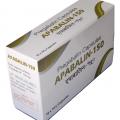Home / Categories / PRECON 75

PRECON 75
PREGABALIN-75MG
DRUGS FOR NEUROPATHIC PAIN
MAGNUS PHARMA PVT LTD-CDCU KHA
Product Details
PREGABALIN
Pregabalin is an anticonvulsant drug used for neuropathic pain, epilepsy and generalized anxiety disorder.[4] It presents antihyperalgesic actions by binding to the α2δ subunit of the voltage-dependent calcium channels without presenting antinociceptive actions. It is considered to have a dependence liability if misused.
Indication
Pregabalin is used for the management of neuropathic pain associated with diabetic peripheral neuropathy or spinal cord injury, and postherpetic neuralgia. It is not approved for the management of fibromyalgia or as adjuntive therapy for adult partial onset seizures.[Label]
Associated Conditions
- Diabetic Peripheral Neuropathic Pain
- Fibromyalgia
- Pain, Neuropathic
- Postherpetic Neuralgia
- Partial onset seizure Epilepsy
Pharmacodynamics
Pregabalin is a structural analog of the inhibitory neurotransmitter gamma-aminobutyric acid (GABA). It has been reported that its action presents the function of modulating the release of many excitatory neurotransmitters such as glutamate, norepinephrine, subtance-P and calcitonin gene related peptide.This modulation can cause an inhibitory modulation of overexcited neurons allowing them to get back to a normal state, including te decrease on the hyper excitability caused by tissue damage.[6] The neurotransmitter modulation allows pregabalin to present antiallodynic, anxiolytic and anticonvulsant activity.[7]
Mechanism of action
Pregabalin binds presynaptically to the alpha2-delta subunit of the voltage-gated calcium channels in central nervous system tissues located in the brain and spinal cord.[6] The mechanism of action has not been fully elucidated but studies suggest that pregabalin produces a disruption of calcium channel traficking or a reduction of calcium currents. The inhibition of subunits of voltage-gated calcium channels reduces calcium release which in order inhibits the release of several neurotransmitters [Label] Studies also suggest that the descending noradrenergic and serotonergic pathways originating from the brainstem may be involved with the mechanism of pregabalin. Interestingly, although pregabalin is a structural derivative of inhibitory neurotransmitter gamma-aminobutyric acid (GABA), it does not bind directly to GABA or benzodiazepine receptors.[8]
TargetActionsOrganismAVoltage-dependent P/Q-type calcium channel subunit alpha-1A
inhibitor
Human
Absorption
Pregabalin has linear and dose-proportional absorption with a steady state achieved at 48-72 hours. Nowadays, there are two different formulations of pregabalin with different pharmacokinetic profiles, this is important due to the fact that the newest formulation has a propety of extended release. Pregabalin, in its both forms, presents a rapid absorption at fasting state. Pregabalin has a Cmax of 3.2mcg/ml, Tmax 0.7 hours and AUC 31.5mcg h/ml, while pregabalin CR (extended release) presents a Cmax 2.0mcg/ml, Tmax 8 hours and AUC 29.4mcg h/ml. Pregabalin is absorbed from the small intestine and proximal colon and its AUC values will depend on the type and quantity of meal calories ingested. [9]
Volume of distribution
Pregabalin does not bind to plasma proteins. The apparent volume of distribution after oral administration is 0.5 L/kg. Pregabalin passage across bloos brain barrier (BBB) is done through the system L. [10]
Protein binding
Pregabalin does not bind to plasma proteins.[Label]
Metabolism
Pregabalin undergoes negligible metabolism in humans.[11]
- Pregabalin
N-methylpregabalin
Route of elimination
Pregabalin presents mainly a renal excretion, it has been reported that 90% of the administered dose is recovered unchanged in the urine. Secondly, it is possible to find N-methylated pregabalin in urine, and this metabolite can account for 0.9% of the dose. Pregabalin (S-enantiomer) did not undergo racemization to the R-enantiomer in pre-clinical studies. [11]
Half life
Mean elimination half-life is 6.3 hours in subjects with normal renal function.[12]
Clearance
Mean renal clearance is estimated to be 67 to 80.9 ml/min in young healthy subjects. Due to its lack of plasma protein binding, it is indicated the presence of renal tubular reabsorption.[Label]
Toxicity
Most common adverse reactions presented in clinical trials are dizziness, somnolence, peripheral edema, nausea, blurred vision, dry mouth and weight gain.[Label]
Affected organisms
- Humans and other mammals
SOURCE: DRUGBANK

